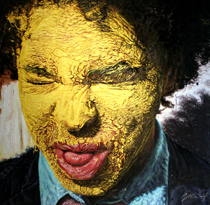When the sun went down, it shed its primness and set pond waters swaying in colours of gild and rose that weaved among the dangling reflections of tall yellow buildings. At the furthest fringe a vessel was immersed in the water and ripples set forth to cover the lake but they somehow died in the passage. The pond lay across a thin road and as the light slowly went out of the sky, the bushy trees began to nestle against the darkness and conceive unreal beings. Those trees that were so friendly in the day now forbade us to come close. The leaves that made up the great canopy of the old tree next to the thin road came together in harmony to shield the discourses of unknown tongues and the deliberations of strange councils. The irksome chattering crows were gone goodness knows where. You wished for their company and their hopping presence among the branches and leaves.
Suddenly a bird would dart forth in the twilight and you would wonder what strange apparition it had seen. The twisted and wrinkled trunk of the old tree made a contrast with its fecundity in springing a thick canopy. The stars would begin to pop in the sky and the distant market near the horizon would throw a halo into the air. The house stood firm on its foundation and regarded its dependent habitations with an air of pensiveness. There was a guava tree that masked the entrance to one of the next grounds in which stood a pleasant cottage. A palm tree stood proud in its conquest of the high electric wires. Behind the little room there were myriad little trees bearing merry little flowers. At their foot you could set up an awning and go around serving the guests who came in the daytime when a wedding was taking place. The soil became quite boggy further, where shrubs grew with taut little berries.
The boundary wall at one side of the front lawn of the house – where the wide street flowed with its cars – was made of cane and fibre; it ended where yet another ground began, and this time, instead of an arching guava tree to cover the wall, creepers straggling and strong made ivy for it. A lone tree stood facing the wide street. It did not bear any grand name. It was one of those common kinds that pale before lofty masters which reach into the blue of the sky. It had been shed of its branches and leaves, giving a sorry hangdog appearance. Yet it occupied its place day after day, sometimes sprouting healthy green leaves in bunches upon its scraped boughs. No one thought of removing this tree and giving the street freedom from its observing scrutiny. The grass on the ground was lush in summer and sparse in winter. It was the winter that was the high time for the excitement of noise and silence.
The sun went on its course and the moon became prominent when we went out of the house or sallied to the little room in the evenings. The streams beside the roads would flow slowly day after day until the time when they became so dark that you could not see their flow. Cascades of light would rain down from the tapering leaves of the implanted trees on the further bank. The bridges would arch and creak while the water struck a rag clinging to an angular stick and eddied away to strike something else. The dust was thick, powdery and everywhere present. If you went in slippers, crossed the street and remained outside long, you had to stand a full five minutes in viscous soap water to return to your original state.
The peddler in the rickshaw went crying his nostrum through his attached magnifying spout. The rickshaw man pressed down his pedal with one foot and moved up the other half of his body, keeping his eyes on the tarmac below his feet without really noticing it. For common ailments the doctor sat in his shed across one of the bridges; for inoculations the compounder came to the house. You sat on one of the stools that supported you with a network of canes that seemed to vanish in the middle before opening out to make a fine circle for a base. The tea would be tempered according to the age of the sipper. The biscuits would carry royal designs and names though ever so routinely vapid they might be. The medicines would bear the look of reliability as they clustered on the table beside the bed.
When the man with the garments came, everybody was called to inspect his wares. The soft fabrics would make a lively motion and spring out of the basket while the eye wondered at the particular shade of blue or red. The dresses lay more sober with their prominent embroidery for the chest. Clothes were a matter of attention though they changed not radically from one point in time to another. The application of creams and lotions was dictated to a certain extent by the black and white photographs in the readable magazines. The old bulb with its yellow light was more reassuring than the harsh presence of the white neon in the next room. On the bed the pliable box containing needles and threads was an object of curiosity, more because of the fair but eroded face on its cover than because of its contents. Little figures were a delight to touch. You took them out from one of the old cupboards and moved your fingers over them ceaselessly as if you heard them purr.




Brilliantly evocative. Reminiscent of The Enigma of Arrival, but the writer has a voice all his own.